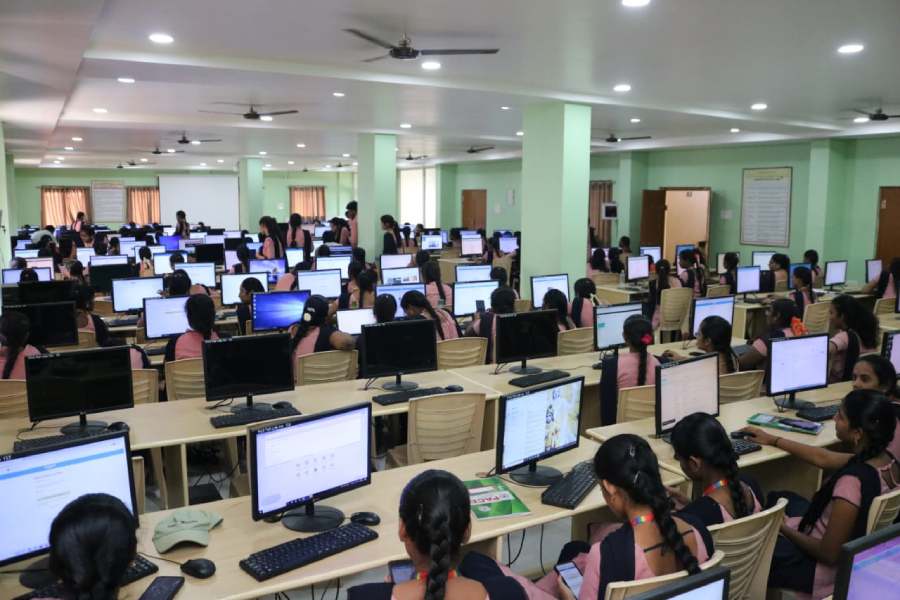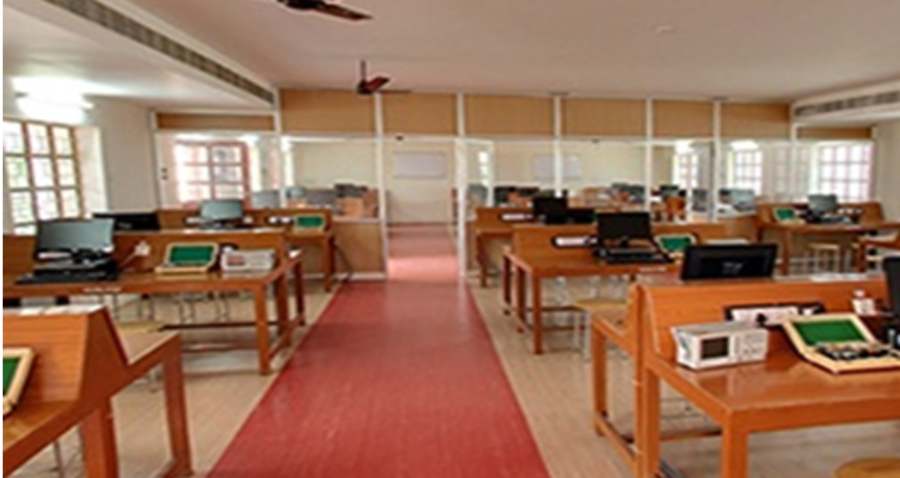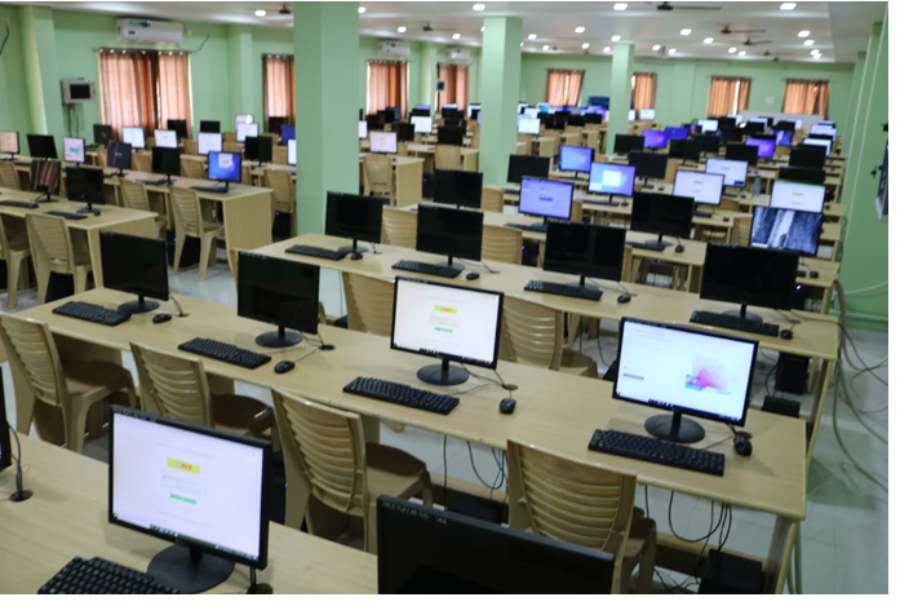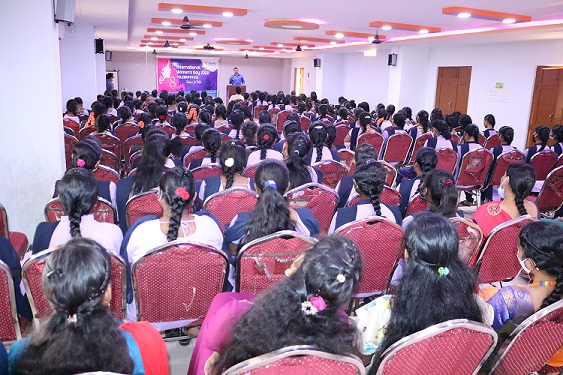The Department of Computer Science and Engineering (Internet of Things and Cyber Security with Block chain Technologies) was established in the year 2020 with an intake of 60 students. We aim at grooming the students on context & project-based learning through mini projects, industry visits, internships, guest lectures, student activities & leadership events, professional society activities like Computer Society of India. We follow the concept of Blended learning through our curriculum where we combine the classroom teaching with online learning and independent study, allowing the students to have more control over the time, pace and style of their learning.
This program aims to develop students with the functional, operational, design, implementation and application aspects of IOT including cyber security and blockchain technology.
To develop professionals in emerging technologies to foster the students globally competent, ethically strong and useful to the Industry and society.
| M1 | Evolving as the center of excellence through creative and innovative teaching learning practices to promote academic achievements. |
| M2 | To promote hands on experience on emerging technologies and to make them industry ready. |
| M3 | To imbibe the professionals with ethics and social values and to nurture them as leaders to strive for the nation. |
| PEO 1 | Graduates will have competent to design, develop and solve Engineering problems and shall have expertise in programming tools |
| PEO 2 | Graduates will be adapt to state of art technologies through continuous learning in the areas of IOT. |
| PEO3 | Graduate should have demonstrate leadership qualities, team work and professional ethics to serve the society |
| PO1 | Engineering knowledge: Apply the knowledge of mathematics, science, engineering fundamentals, and an engineering specialization to the solution of complex engineering problems. |
| PO2 | Problem analysis: Identify, formulate, review research literature, and analyze complex engineering problems reaching substantiated conclusions using first principles of mathematics, natural sciences, and engineering sciences. |
| PO3 | Design/development of solutions: Design solutions for complex engineering problems and design system components or processes that meet the specified needs with appropriate consideration for the public health and safety, and the cultural, societal, and environmental considerations. |
| PO4 | Conduct investigations of complex problems: Use research-based knowledge and research methods including design of experiments, analysis and interpretation of data, and synthesis of the information to provide valid conclusions. |
| PO5 | Modern tool usage: Create, select, and apply appropriate techniques, resources, and modern engineering and IT tools including prediction and modeling to complex engineering activities with an understanding of the limitations. |
| PO6 | The engineer and society: Apply reasoning informed by the contextual knowledge to assess societal, health, safety, legal and cultural issues and the consequent responsibilities relevant to the professional engineering practice. |
| PO7 | Environment and sustainability: Understand the impact of the professional engineering solutions in societal and environmental contexts, and demonstrate the knowledge of, and need for sustainable development. |
| PO8 | Ethics: Apply ethical principles and commit to professional ethics and responsibilities and norms of the engineering practice. |
| PO9 | Individual and team work: Function effectively as an individual, and as a member or leader in diverse teams, and in multidisciplinary settings. |
| PO10 | Communication: Communicate effectively on complex engineering activities with the engineering community and with society at large, such as, being able to comprehend and write effective reports and design documentation, make effective presentations, and give and receive clear instructions. |
| PO11 | Project management and finance: Demonstrate knowledge and understanding of the engineering and management principles and apply these to one's own work, as a member and leader in a team, to manage projects and in multidisciplinary environments. |
| PO12 | Life-long learning: Recognize the need for, and have the preparation and ability to engage in independent and life-long learning in the broadest context of technological change |
| PSO1 | Ability to apply mathematical concepts, algorithm design techniques and suitable Data structures to solve practical problems using different problem-solving strategies. |
| PSO2 | Ability to design computing solutions for problems in interdisciplinary areas. |
Implementation of Mentor-Mentee concept : Enables focus on individual students, increasing the scope of giving guidance, counseling and monitoring for better improvement of each and every student.
Group Discussions: The students participate in mock interviews and group discussions to give them a sense of confidence and groom them towards professionalism.
Assignments: The best teaching practice-formative assessment, assignment design to foster student engagement and ownership
Placement Oriented Training : Campus recruitment training (CRT) is given to the students from II year onwards to cater the needs of students for placements.
FOR MORE DETAILS CLICK HERE| S.No | Name of the Faculty | Qualification | Designation | Date of Joining | Nature of Appointment |
| 1 | Dr.B.Srikanth | Ph.D | HOD | 01.01.2024 | Regular |
| 2 | GANGOLU SREEDEVI | M.Tech | Assistant Professor | 05.06.2012 | Regular |
| 3 | KOLAKALURI ANURADHA | M.Tech | Assistant Professor | 01.03.2023 | Regular |
| 4 | NALLAMALA BHASKARA REDDY | M.Tech | Assistant Professor | 21.02.2022 | Regular |
| 5 | VENNAPUSA MOUNICA | M.Tech | Assistant Professor | 01.06.2018 | Regular |
| 6 | NADELLA RAVINDRA | M.Tech | Assistant Professor | 01.01.2024 | Regular |
| 7 | KOLLURU SWARNALATHA | M.Tech | Assistant Professor | 16.06.2021 | Regular |
| 8 | THANNIRU HARI KRISHNA | M.Tech | Assistant Professor | 01.12.2021 | Regular |
| 9 | SINGAMNENI PAVANI | M.Tech | Assistant Professor | 28.02.2022 | Regular |
| 10 | ANGADI VENKATESWARLU | M.Tech | Assistant Professor | 01.11.2020 | Regular |
| 11 | DAVARAPALLI ANANDAM | M.Tech | Assistant Professor | 20.07.2022 | Regular |
| 12 | NELLURU ANJANEYULU | M.Tech | Assistant Professor | 01.05.2023 | Regular |
Mobile app development is a term used to denote the act or process by which a mobile app is developed for mobile devices, such as personal digital assistants, enterprise digital assistants or mobile phones. Key mobile app development process steps include ideation and research, UX/UI design, development, testing, deployment and post-launch optimization. Every stage is equally important for building a reliable, high-performing application within delivery timelines and budget. Application development is the process of creating a computer program or a set of programs to perform the different tasks that a business requires. From calculating monthly expenses to scheduling sales reports, applications help businesses automate processes and increase efficiency. The current Lab facility was inaugurated in 2016.

IoT Laboratory was formulated considering the vision of long-term sustainable development of IoT-enabled applications and services. The lab contains all the components needed to start the development of IoT-based systems. It includes many microcontroller boards like Arduino and Raspberry Pi, WiFi modules, sensors, actuators, etc. IoT Lab helps the students to thoroughly understand the concepts of IoT and enables them to try out their own ideas. IoT Lab was established by IEDC (Innovation and Entrepreneurship Development Cell)PACE, in association with AP Startup Mission, The current Lab facility was inaugurated in 2018.

The 'Sensor Technology Lab' deals with working principles, factors governing performance, and identifying static and dynamic characteristics of all major sensors. The first principle model which is running in the background will represent ideal characteristics. The configurable parameter will give an insight to students about the deviations from standard or expected field application. Sensor Technology Laboratory is equipped with different Physical Sensors, Agilent Digital Storage Oscilloscope, Infrared Camera, Hot wire anemometer, Agilent Lab station, Pico ammeter and arbitrary waveform generator. The current Lab facility was inaugurated in 2015.

You will be using R to complete all data analysis tasks in this class. For those who have never used R or it has been a long time since you’ve used the program, R is a free, open source statistical programming language. It is useful for data cleaning, analysis, and visualization. R is an interpreted language, not a compiled one. This means that you type something into R and it does what you tell it. It is both command line software and a programming environment. It is an extensible, open-source language and computing environment for Windows, Macintosh, UNIX, and Linux platforms, which allows for the user to freely distribute, study, change, and improve the software. It is basically a free, super big, and complex calculator. You will be using R to accomplish all data analysis tasks in this class. The current Lab facility was inaugurated in 2016.


| YEAR | I | II | III |
| 2021 | 21KQ1A4717 P ANUSHA |
21KQ1A4702 B SWETHA |
20KQ1A4751 PALURI GIRINDAR REDDY |
| 2020 | 20KQ1A4711 PADARTHI VENKATASIVASAILAKSHMICHANDRIKA |
20KQ1A4711 PADARTHI VENKATASIVASAILAKSHMICHANDRIKA |
| S.No | Name of the Faculty | Research Group |
1 |
Dr.T.R.CHAITANYA - MENTOR |
|
2 |
Dr.M.CHANDRANAIK |
|
3 |
Dr. NEDUNCHEZHIAN |
|
4 |
G.SRINIVASA RAO |
|
5 |
CH.RAVINDRA |
|
6 |
P.LOKAIAH |
|
7 |
V SURESH |
|
8 |
Dr.S. RAJ ANAND - MENTOR |
|
9 |
Dr G SAMBA SIVA RAO |
|
10 |
M.SRINIVASA RAO |
|
11 |
B.SRAVANI |
|
12 |
S.SRINIVASULU |
|
13 |
G.SWATHI |
|
14 |
CH.SANDHYA RANI |
|
15 |
M.DEDEEPYA |
|
16 |
SK. JILANI BASHA |
|
17 |
G.SWATHI |
|
18 |
DR K.G.S VENKATESAN - MENTOR |
|
19 |
DR P PRABAKARAN |
|
20 |
B SREENIVASULU |
|
21 |
S.PHANI KUMAR |
|
22 |
Dr.S.RADHA KRISHNAN - MENTOR |
|
23 |
S.GIRI BABU |
|
24 |
V.GOPI KRISHNA |
|
25 |
D.JANARDHAN REDDY |
|
26 |
SK. HEENA KAUSER |
|
27 |
Dr M SREENIVASULU - MENTOR |
|
28 |
Dr K VENKATA RAMANA |
|
29 |
E.V.N.JYOTHI |
|
30 |
D ANANDAM |
|
31 |
P.SREEHARI |
|
32 |
V.SRIHARSHA |
|
33 |
A.RAMYA KRISHNA |
|
34 |
P.V. SUBBAREDDY |
© PACE INSTITUTE OF TECHNOLOGY AND SCIENCES (PACE ITS)